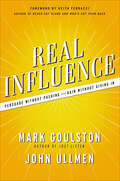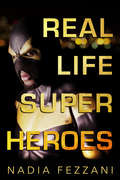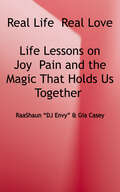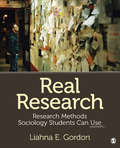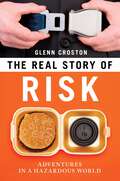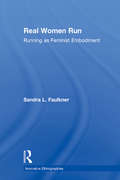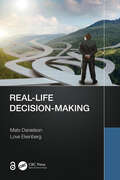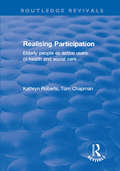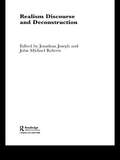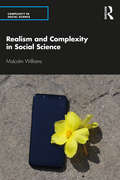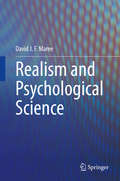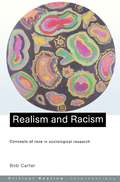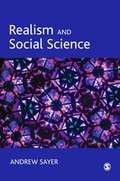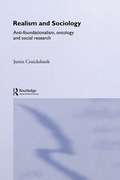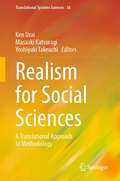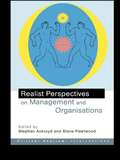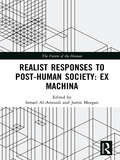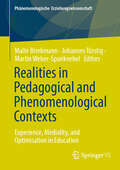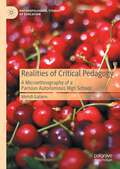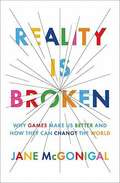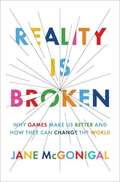- Table View
- List View
Real Influence: Persuade Without Pushing and Gain Without Giving In
by Mark Goulston John UllmenAuthentic influence is about more than creating a strong initial connection--it&’s about sustaining professional relationships long after an agreement has been reached.When others sense they are being pushed, their guard goes up. In business interactions, even if the person you are pitching to does comply with your requests, lingering resentment may undermine the relationship forever. So why do most books on influence still portray it as something you do to someone else to get your way?Based on their commitment to listening, genuine engagement, and the pursuit of win-win outcomes, doctors and authors Mark Goulston and John Ullmen share a new method that business leaders can utilize to persuade others.In Real Influence, Goulston and Ullem teach you how to:examine priorities,learn about the needs of key players,earn others&’ attention,motivate others to hear more,and add value with question and actions.Outdated approaches that portray influence as a means to get your way invites resistance and cynicism from those who recognize the techniques. Manipulative tactics fail to produce the mutual trust that sustains successful relationships.Complete with examples of the steps in action and insights from real-world &“power influencers,&” Real Influence is a one-of-a-kind guide that showcases how being straight with everyone means winning for all.
Real Life Super Heroes
by Nadia FezzaniAn in-depth look at the men and women who call themselves "Real Life Super Heroes." <P><P> Dressed like heroes from comic books and action movies, Real Life Super Heroes are out there. They dress up at night, fight crime, save people, and some of them even have secret identities. Are they ordinary, mild-mannered citizens, or are they larger-than-life characters, determined to fight crime, risking life and limb to defend victims of violence and injustice? And why do some choose to reveal their true identities, while others prefer to remain anonymous? <P><P> Guided by a reporter’s instincts and a thrill-seeking nature, journalist Nadia Fezzani sets out in search of the secret lives of these men and women, who put themselves in harm’s way to protect their fellow human beings. <P><P>Through interviews and patrols with these heroes, she discovers what lies behind their activities. After facing gunmen and other dangers on patrol, Fezzani has crafted a psychologically fascinating look at Real Life Super Heroes and their world.
Real Life, Real Love: Life Lessons On Joy, Pain and the Magic That Holds Us Together
by RaaShaun Dj Envy Gia CaseyGia and Raashaun Casey met when they were two teenagers attending the same high school in Queens. They have been together for an astounding 27 years and married for 20. They have remained together through Raashaun's growing celebrity, a devastating (and very public) cheating scandal, and the births of six children. Now, more than a quarter of a century into their relationship, they are stronger and more committed to each other than they've ever been, and their fans are clamoring to know how they did it. In Real Life, Real Love, Gia and Raashaun explore the entire chronology of their love story with remarkable vulnerability, searing honesty, and a lot of humor. It's a riveting narrative about how to grow together, an aspirational guidebook for people who seek the same unconditional love in their relationships, and an in-depth look at how to remain equals after being thrust into the public eye.
Real Research: Research Methods Sociology Students Can Use
by Liahna E. GordonReal Research: Research Methods Sociology Students Can Use by Liahna Gordon is an innovative text that takes a holistic approach to the subject by discussing each step in the research process within the context of a particular method. After an opening chapter that surveys different methods of data collection and the components of research, students proceed immediately to chapters on specific methods. Each of these chapters begins with a description of the method and the logic that underlies it, so that students can see how each step in the research process fits within the logic of that particular method. The chapters then go on to present all of the steps of research as they relate to that particular research method, from writing research questions through analysis. With this format, instructors can begin engaging students in hands-on exercises almost immediately, increasing interest in and comprehension of the material.
Real Research: Research Methods Sociology Students Can Use
by Liahna E. GordonReal Research: Research Methods Sociology Students Can Use by Liahna Gordon is an innovative text that takes a holistic approach to the subject by discussing each step in the research process within the context of a particular method. After an opening chapter that surveys different methods of data collection and the components of research, students proceed immediately to chapters on specific methods. Each of these chapters begins with a description of the method and the logic that underlies it, so that students can see how each step in the research process fits within the logic of that particular method. The chapters then go on to present all of the steps of research as they relate to that particular research method, from writing research questions through analysis. With this format, instructors can begin engaging students in hands-on exercises almost immediately, increasing interest in and comprehension of the material.
Real Story of Risk: Adventures in a Hazardous World
by Glenn CrostonWe live in a world of risk. It waits for us in our refrigerator and surrounds us on the freeway. It's lurking in our arteries and sitting in our 401(k) accounts. Given that we deal with risk on a constant basis, we should be good at it; as it turns out, though, we're not. We're blind to common risks like heart disease (one in five deaths), but we shrink in fear from rare events like shark attacks (one in a million) and airplane crashes (one in twenty thousand). What accounts for our poor ability to perceive and react to the risks that really matter? Starting from an evolutionary perspective, the author traces our distorted perception of risk back to our ancestors, reminding readers that we are all the culmination of a long line of survivors who fought life-and-death threats such as attacks from wild animals, starvation, and disease. The fact that we have covered Earth with seven billion people is a testament to our skill at overcoming these risks. But our spectacular success has also produced our contemporary artificial world with new threats like climate change, chili dogs, and online gambling. Our brains, which evolved to deal with the ancient world, are ill equipped to process the new threats we face. Croston examines the many facets of our hazardous modern environment that we only dimly perceive. He explains why we let our guard down for a beautiful face, why slow-moving risks (like rising seas) are hard to stop, how a good story (though false) can be more persuasive than dry statistics (even alarming ones), what we fear even more than death, and many other intriguing quirks about our built-in incompetence to adequately handle present-day risks. Offering a wealth of fascinating information about health, sex, money, safety, food, and the environment, this book illuminates an often-misunderstood but crucial aspect of daily life.
Real Women Run: Running as Feminist Embodiment
by Sandra L. FaulknerReal Women Run is an innovative feminist ethnography that consists of a series of linked essays and presentations about women who run at the intersections of queer, feminist, and running identities. Faulkner uses feminist grounded theory, poetic inquiry, and qualitative content analysis to examine women’s embodied stories of running: how they run, how running fits into the context of their lives and relationships, how they enact or challenge cultural scripts of women’s activities and normative running bodies, and what running means for their lives and identities. During a two-and-a-half-year ethnography with women who run, Faulkner engaged in an intersectional qualitative content analysis of websites and blogs targeted to women runners, a grounded theory poetic analysis of 41 interviews with women who run, and participant observation at road races. Real Women Run speaks to the call for a more physical feminism. This ethnography sees women’s physical and mental strength developed through running as a way to embrace the contradictions between a deconstructed focus on the mind/body split and the focus on individuals’ actual material bodies and their everyday interactions with their bodies and through their bodies with the world around them.
Real-Life Decision-Making
by Love Ekenberg Mats DanielsonHave you ever experienced a decision situation that was hard to come to grips with? Did you ever feel a need to improve your decision-making skills? Is this something where you feel that you have not learned enough practical and useful methods? In that case, you are not alone! Even though decision-making is both considered and actually is a very important skill in modern work-life as well as in private life, these skills are not to any reasonable extent taught in schools at any level. No wonder many people do indeed feel the need to improve but have a hard time finding out how. This book is an attempt to remedy this shortcoming of our educational systems and possibly also of our common, partly intuition-based, decision culture. Intuition is not at all bad, quite the contrary, but it has to co-exist with rationality. We will show you how.Methods for decision-making should be of prime concern to any individual or organisation, even if the decision processes are not always explicitly or even consciously formulated. All kinds of organisations, as well as individuals, must continuously make decisions of the most varied nature in order to prosper and attain their objectives. A large part of the time spent in any organisation, not least at management levels, is spent gathering, processing, and compiling information for the purpose of making decisions supported by that information. The same interest has hitherto not been shown for individual decision-making, even though large gains would also be obtained at a personal level if important personal decisions were better deliberated. This book aims at changing that and thus attends to both categories of decision-makers.This book will take you through a journey starting with some history of decision-making and analysis and then go through easy-to-learn ways of structuring decision information and methods for analysing the decision situations, beginning with simple decision situations and then moving on to progressively harder ones, but never losing sight of the overarching goal that the reader should be able to follow the progression and being able to carry out similar decision analyses in real-life situations.The Open Access version of this book, available at www.taylorfrancis.com, has been made available under a Creative Commons Attribution-Non Commercial-No Derivatives 4.0 license.
Realising Good Growth: A Practical Guide for Business Leaders
by Simon Townsend Steve Kempster Stewart Barnes Jamie RuddRealising Good Growth is a practical and purposeful guidebook for leaders wishing to take a different path on a journey towards collective purpose and a better world, where profit is not the destination, just one of the sturdy pillars that supports the journey.Values to shape your journeyOur blueprint is drawn with values of sustainability, long-term vision, mutual enhancement and cooperation.Digital supportThe guidebook is supported by a range of integrated, tried-and-tested digital tools and accompanying website for practical use.What's in it for you and others?For businesses, the regenerative opportunity is about greater competitive advantage, retaining and attracting the best employees, enhanced innovation and productivity, and a greater return on all assets......But that fades into the shade in comparison to enhancing lives and enabling humanity to flourish.True success is measured not by profits alone, but by the lives we enrich and the future we create for all.Humanity has a big problem. Growth! More precisely the nature of growth and its consequences.We are passengers on a runaway train, hurtling toward a fractured and barren landscape. If we do not pull the emergency brake soon, we will leave our children stranded in a desolate wasteland, where the fertile fields of today are but a distant memory.But imagine a different outcome if this is resolved.Imagine a different path to follow, one less travelled, where businesses are a force for good.Imagine a regenerative economy led by businesses of all sizes pursuing an agenda of Good Growth – where employees have a deep sense of engagement and ownership in helping to grow businesses that deliver social value.Now, it is about experience, fulfilment and community – not one of self-centred endless consumption.
Realising Linguistic, Cultural and Educational Rights Through Non-Territorial Autonomy
by David J. Smith Ivan Dodovski Flavia GhenceaThis volume assesses Non-Territorial Autonomy (NTA) in terms of its practical capacity to support the linguistic, cultural, and educational rights of national minority groups across Europe. The fact that 2023 marks the 25th anniversary of the coming into force of the Council of Europe Framework Convention on National Minorities (FCNM) and European Charter for Regional and Minority languages (ECRML) makes this book especially timely and relevant. Its numerous detailed empirical studies, one of which uses FCNM reporting as a benchmark, give a picture of the extent (or otherwise) to which international minority rights standards are actually being realized through various NTA arrangements. In keeping with the principles laid out in these foundational documents, the contributions to this volume acknowledge that when it comes to the effective delivery of linguistic, cultural and educational rights, NTA is best regarded not as an alternative but as a complement to territorially based arrangements.This is an open access book.
Realising Participation: Elderly People as Active Users of Health and Social Care (Routledge Revivals)
by Tom Chapman Kathryn RobertsThis title was first published in 2001: During the last twenty years government rhetoric in the UK has increasingly advocated that statutory health and social care services should regard and treat recipients as 'consumers' in the same way as companies and organizations in the private sector. This involves a considerable cultural change on the part of both service providers and their clients, and this timely study explores the extent to which such a cultural change is actually taking place in British society. The utilization of welfare services by a sample of people aged 70 and above on discharge from inpatient care and in a short period afterwards is examined as a critical testbed for key components of consumerism, including participation, representation, access, choice, information and redress. The book explores not only the extent to which opportunities are being provided for users to play an active role in their care, but also their degree of willingness to assume such a role. By investigating the experiences of clients from a generation which might be considered relatively resistant to a more active participation in health and social care, the study offers an important insight into the extent to which a real social transformation is indeed taking place in the British welfare services.
Realism Discourse and Deconstruction (Routledge Studies in Critical Realism)
by Jonathan Joseph John Michael RobertsTheories of discourse bring to realism new ideas about how knowledge develops and how representations of reality are influenced. We gain an understanding of the conceptual aspect of social life and the processes by which meaning is produced. This collection reflects the growing interest realist critics have shown towards forms of discourse theory and deconstruction. The diverse range of contributions address such issues as the work of Derrida and deconstruction, discourse theory, Eurocentrism and poststructuralism. What unites all of the contributions is a sense that it is essential to provide a realist alternative to the hitherto dominance of social constructionism, hermeneutics and postmodernism, over many of the issues discussed. By developing a realist perspective the different authors attempt to embed discourse within the structured nature of the reality of the world. Realism can situate language, discourse and ideology within context specific, or 'causally efficacious' circumstances. Realism can help to uncover issues of power, representation, and subjectivity and how discursive and other social practices produce real effects. This can help us understand the manner in which (non-discursive) social structures are reproduced through various forms of ideology and discourse. And by knowing this, we can start to address questions concerning human emancipation and how the world is to be transformed.
Realism and Complexity in Social Science (Complexity in Social Science)
by Malcolm WilliamsRealism and Complexity in Social Science is an argument for a new approach to investigating the social world, that of complex realism. Complex realism brings together a number of strands of thought, in scientific realism, complexity science, probability theory and social research methodology. It proposes that the reality of the social world is that it is probabilistic, yet there exists enough invariance to make the discovery and explanation of social objects and causal mechanisms possible. This forms the basis for the development of a complex realist foundation for social research, that utilises a number of new and novel approaches to investigation, alongside the more traditional corpus of quantitative and qualitative methods. Research examples are drawn from research in sociology, epidemiology, criminology, social policy and human geography. The book assumes no prior knowledge of realism, probability or complexity and in the early chapters, the reader is introduced to these concepts and the arguments against them. Although the book is grounded in philosophical reasoning, this is in a direct and accessible style that will appeal both to social researchers with a methodological interest and philosophers with an interest in social investigation.
Realism and Psychological Science
by David J. MareeThe book provides an argument why realism is a viable metatheoretical framework for psychological science. By looking at some variations of realism such as scientific realism, critical realism, situational realism and Ferraris’ new realism, a realist view of science is outlined that can feature as a metatheory for psychological science. Realism is a necessary correction for the mythical image of science responsible for and maintained by a number of dichotomies and polarities in psychology. Thus, the quantitative-qualitative dichotomy, scientist-practitioner polarity and positivist-constructionist opposition feed off and maintains a mythic image of science on levels of practice, methods and metatheory. Realism makes a clear distinction between ontology and epistemic access to reality, the latter which easily fits with softer versions of constructionism, and the former which grounds science in resistance and possibility, loosely translated as criticism. By taking science as a critical activity an issue such as the quantitative imperative looses its defining force as a hallmark of science - it provides epistemic access to certain parts of reality. In addition, essentially critical activities characteristic of various qualitative approaches may be welcomed as proper science. Academics, professionals and researchers in psychology would find value in situating their scholarly work in a realist metatheory avoiding the pitfalls of traditional methodologies and theories.
Realism and Racism: Concepts of Race in Sociological Research (Critical Realism Ser.)
by Bob CarterThere are continuing difficulties within social science surrounding concepts of race. This book suggests that these difficulties stem from the uncertain ontological and epistemological status of ideas about race, itself a consequence of the recognition that concepts of race have all but lost their relevance as sociologically significant descriptions. This book surveys ways in which social scientists have attempted to come to terms with this situation, before developing an alternative approach based on recent work by realist authors. This approach offers a radical revision of orthodox debates about race concepts, about the possibility of a social science and about the nature of empirical research. This illustrated through two policy examples: an account of post war migration to the UK, and debates about trans-racial adoption in the UK and the USA.
Realism and Social Science
by Dr Andrew SayerRealism and Social Science offers the reader an authoritative and compelling guide to critical realism and its implications for social theory and for the practice of social science. It offers an alternative both to approaches which are overly confident about the possibility of a successful social science and those which are defeatist about any possibility of progress in understanding the social world. Written by one of the leading social theorists in the field, it demonstrates the virtues of critical realism for theory and empirical research in social science, and provides a critical engagement with leading non-realist approaches.
Realism and Sociology: Anti-Foundationalism, Ontology and Social Research (Routledge Studies in Critical Realism)
by Justin CruickshankIn recent years, methodological debates in the social sciences have increasingly focused on issues relating to epistemology. Realism and Sociology makes an original contribution to the debate, charting a middle ground between postmodernism and positivism.Critics often hold that realism tries to assume some definitive account of reality. Against this it is argued throughout the book that realism can combine a strong definition of social reality with an anti-foundational approach to knowledge. The position of realist anti-foundationalism that is argued for is developed and defended via the use of immanent critiques. These deal primarily with post-Wittgensteinian positions that seek to define knowledge and social reality in terms of 'rule-following practices' within different 'forms of life' and 'language games'. Specifically, the argument engages with Rorty's neo-pragmatism and the structuration theory of Giddens. The philosophy of Popper is also drawn upon in a critically appreciative way.While the positions of Rorty and Giddens seek to deflate the claims of 'grand theory', albeit in different ways, they both end up with definitive claims about knowledge and reality that preclude social research. By avoiding the general deflationary approach that relies on reference to 'practices', realism is able to combine a strong social ontology with an anti-foundational epistemology, and thus act as an underlabourer for empirical research.
Realism for Social Sciences: A Translational Approach to Methodology (Translational Systems Sciences #36)
by Yoshiyuki Takeuchi Ken Urai Masaaki KatsuragiThis book discusses the growing interest in realism in social sciences of the twenty-first century. The first part of this book provides recent discussions on realism in philosophy. The second part describes specific problems that have returned to realism in various fields of the social sciences, such as economics, cultural anthropology, management science, and statistics. This book clarifies what kinds of movements are taking place and consequently the direction in which the social sciences are heading in the future. Readers would also find that there is great diversity in the way realism and reality are perceived and understood, depending on the objectives and circumstances of each field of social science. This suggests that rather than having a unified view (stance) of realism and reality, it may be more meaningful to value the differences, diversity, and range itself. Therefore, this book does not present a unified view of realism, reality, and actuality. Although the definitions of realism and reality may differ from chapter to chapter, this represents a corner of the current state of the social sciences. This book is unique in that it examines how the issues of realism and reality are viewed, understood, and dealt with in the various fields of social science, instead of examining them by philosophers and philosophers of science. This would clarify how philosophical discussions have been translated into the various fields of social science.
Realist Perspectives on Management and Organisations (Critical Realism Ser.)
by Steve Fleetwood Stephen AckroydRealism has been one of the most powerful new developments in philosophy and the social sciences and is now making an increasing impact in business and management studies. This is the first book-length treatment of critical realism in business and management. It pulls together a wide range of material which is all explicitly or implicitly rooted in philosophical realism, and combines theoretical writing with substantive contributions addressing issues such as the nature of the firm and the labour process which together demonstrates that realism is a powerful alternative to postmodernism and positivism.
Realist Responses to Post-Human Society: Ex Machina (The Future of the Human)
by Jamie Morgan Ismael Al-AmoudiThis volume is the first of a trilogy which investigates, from a broadly realist perspective, the place, and challenges, of the human in contemporary social orders. The authors, all members of the Centre for Social Ontology, ask what is specific about humanity’s nature and worth, and what are their main challenges in contemporary societies? Examining the ways in which recent advances in technology threaten to blur and displace the boundaries constitutive of our shared humanity, Realist Responses to Post-Human Society: Ex Machina explores the philosophical and ethical questions raised by these developments, and discusses the dangers posed by the combination of transhumanism with post-humanist social theories and antihumanist practices, institutions and ideologies.
Realities in Pedagogical and Phenomenological Contexts: Experience, Mediality, and Optimisation in Education (Phänomenologische Erziehungswissenschaft #13)
by Malte Brinkmann Johannes Türstig Martin Weber-SpanknebelWhat is real? What is evident? What is true? These questions of the constitution of reality in our experiences are among the key questions of phenomenology since its beginning. Lately, they become especially relevant under conditions of digitalisation, acceleration, optimisation, crises, and pandemics. In this volume, these questions are taken up in different interdisciplinary and intercultural, phenomenological perspectives from a pedagogical point of view. Starting from a critique of instrumental scientism and optimisation, the contributions in this book ask about the theoretical, empirical, methodological, and practical constitution of reality within experiences of learning, Bildung, and education, as well as the subjects, materialities, and mediality of such experiences in different pedagogical fields and institutions. The contributions show how Phenomenological Pedagogy is fruitful to explore the realities of pedagogical practices, by grasping lifeworldy, lived-bodily, and social experiences in a qualitatively meaningful, empirical and experience-oriented way. It can thus serve as an alternative to positivistic, scientistic, idealistic, or psychologistic approaches.
Realities of Critical Pedagogy: A Microethnography of a Parisian Autonomous High School (Anthropological Studies of Education)
by Mehdi GaliereThis book examines how the Lycée autogéré de Paris, an experimental high school established in 1982 which claims to implement critical and democratic pedagogical practices, contributes to the development of counter-hegemonic educational and social practices. The author presents and analyses significant discursive data on the school’s pedagogical practice, focusing specifically on triangulation, from general assemblies to official texts, pedagogic projects and everyday interactions inside and outside the institution. He then argues that the discourses of the self-managed high school tend to be critical of the French state’s neoliberal discourse on education while favouring the development of practices of solidarity within the local and broader context of the institution. The book will be of interest to students and scholars in the fields of sociology of education, sociolinguistics and education for social justice.
Reality Is Broken
by Jane McgonigalVisionary game designer Jane McGonigal reveals how we can harness the power of games to solve real-world problems and boost global happiness. More than 174 million Americans are gamers, and the average young person in the United States will spend ten thousand hours gaming by the age of twenty-one. According to world-renowned game designer Jane McGonigal, the reason for this mass exodus to virtual worlds is that videogames are increasingly fulfilling genuine human needs. In this groundbreaking exploration of the power and future of gaming, McGonigal reveals how we can use the lessons of game design to fix what is wrong with the real world. Drawing on positive psychology, cognitive science, and sociology, Reality Is Broken uncovers how game designers have hit on core truths about what makes us happy and utilized these discoveriesto astonishing effect in virtual environments. Videogames consistently provide the exhilarating rewards, stimulating challenges, and epic victories that are so often lacking in the real world. But why, McGonigal asks, should we use the power of games for escapist entertainment alone? Her research suggests that gamers are expert problem solvers and collaborators because they regularly cooperate with other players to overcome daunting virtual challenges, and she helped pioneer a fast-growing genre of games that aims to turn gameplay to socially positive ends. In Reality Is Broken, she reveals how these new alternate reality games are already improving the quality of our daily lives, fighting social problems such as depression and obesity, and addressing vital twenty-first-century challenges-and she forecasts the thrilling possibilities that lie ahead. She introduces us to games like World Without Oil, a simulation designed to brainstorm-and therefore avert- the challenges of a worldwide oil shortage, and Evoke, a game commissioned by the World Bank Institute that sends players on missions to address issues from poverty to climate change. McGonigal persuasively argues that those who continue to dismiss games will be at a major disadvantage in the coming years. Gamers, on the other hand, will be able to leverage the collaborative and motivational power of games in their own lives, communities, and businesses. Written for gamers and nongamers alike, Reality Is Broken shows us that the future will belong to those who can understand, , and play games. Watch a Video .
Reality Is Broken: Why Games Make Us Better and How They Can Change the World
by Jane McgonigalVisionary game designer Jane McGonigal reveals how we can harness the power of games to solve real-world problems and boost global happiness. More than 174 million Americans are gamers, and the average young person in the United States will spend ten thousand hours gaming by the age of twenty-one. According to world-renowned game designer Jane McGonigal, the reason for this mass exodus to virtual worlds is that videogames are increasingly fulfilling genuine human needs. In this groundbreaking exploration of the power and future of gaming, McGonigal reveals how we can use the lessons of game design to fix what is wrong with the real world. Drawing on positive psychology, cognitive science, and sociology, Reality Is Broken uncovers how game designers have hit on core truths about what makes us happy and utilized these discoveries to astonishing effect in virtual environments. Videogames consistently provide the exhilarating rewards, stimulating challenges, and epic victories that are so often lacking in the real world. But why, McGonigal asks, should we use the power of games for escapist entertainment alone? Her research suggests that gamers are expert problem solvers and collaborators because they regularly cooperate with other players to overcome daunting virtual challenges, and she helped pioneer a fast-growing genre of games that aims to turn gameplay to socially positive ends. In Reality Is Broken, she reveals how these new alternate reality games are already improving the quality of our daily lives, fighting social problems such as depression and obesity, and addressing vital twenty-first-century challenges-and she forecasts the thrilling possibilities that lie ahead. She introduces us to games like World Without Oil, a simulation designed to brainstorm-and therefore avert- the challenges of a worldwide oil shortage, and Evoke, a game commissioned by the World Bank Institute that sends players on missions to address issues from poverty to climate change. McGonigal persuasively argues that those who continue to dismiss games will be at a major disadvantage in the coming years. Gamers, on the other hand, will be able to leverage the collaborative and motivational power of games in their own lives, communities, and businesses. Written for gamers and nongamers alike, Reality Is Broken shows us that the future will belong to those who can understand, design, and play games.
Reality Is Broken: Why Games Make Us Better and How They Can Change the World
by Jane McgonigalVisionary game designer Jane McGonigal reveals how we can harness the power of games to solve real-world problems and boost global happiness. More than 174 million Americans are gamers, and the average young person in the United States will spend ten thousand hours gaming by the age of twenty-one. According to world-renowned game designer Jane McGonigal, the reason for this mass exodus to virtual worlds is that videogames are increasingly fulfilling genuine human needs. In this groundbreaking exploration of the power and future of gaming, McGonigal reveals how we can use the lessons of game design to fix what is wrong with the real world.Drawing on positive psychology, cognitive science, and sociology, Reality Is Broken uncovers how game designers have hit on core truths about what makes us happy and utilized these discoveriesto astonishing effect in virtual environments. Videogames consistently provide the exhilarating rewards, stimulating challenges, and epic victories that are so often lacking in the real world. But why, McGonigal asks, should we use the power of games for escapist entertainment alone? Her research suggests that gamers are expert problem solvers and collaborators because they regularly cooperate with other players to overcome daunting virtual challenges, and she helped pioneer a fast-growing genre of games that aims to turn gameplay to socially positive ends.In Reality Is Broken, she reveals how these new alternate reality games are already improving the quality of our daily lives, fighting social problems such as depression and obesity, and addressing vital twenty-first-century challenges-and she forecasts the thrilling possibilities that lie ahead. She introduces us to games like World Without Oil, a simulation designed to brainstorm-and therefore avert- the challenges of a worldwide oil shortage, and Evoke, a game commissioned by the World Bank Institute that sends players on missions to address issues from poverty to climate change.McGonigal persuasively argues that those who continue to dismiss games will be at a major disadvantage in the coming years. Gamers, on the other hand, will be able to leverage the collaborative and motivational power of games in their own lives, communities, and businesses. Written for gamers and nongamers alike, Reality Is Broken shows us that the future will belong to those who can understand, , and play games.Watch a Video
